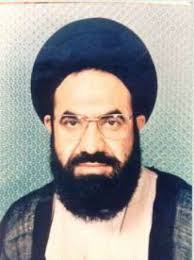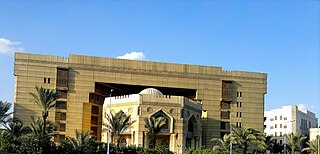
Imam is an Islamic leadership position. For Sunni Muslims, Imam is most commonly used as the title of a prayer leader of a mosque. In this context, imams may lead Islamic prayers, serve as community leaders, and provide religious guidance. Thus for Sunnis, anyone can study the basic Islamic sciences and become an Imam.
Shia Islam is the second-largest branch of Islam. It holds that the Islamic prophet Muhammad designated ʿAlī ibn Abī Ṭālib as his successor (khalīfa) and the Imam after him, most notably at the event of Ghadir Khumm, but was prevented from succeeding Muhammad as the leader of the Muslims as a result of the choice made by some of Muhammad's other companions (ṣaḥāba) at Saqifah. This view primarily contrasts with that of Sunnī Islam, whose adherents believe that Muhammad did not appoint a successor before his death and consider Abū Bakr, who was appointed caliph by a group of senior Muslims at Saqifah, to be the first rightful (rāshidūn) caliph after Muhammad. Adherents of Shia Islam are called Shia Muslims.

In Islam, the ulama, also spelled ulema, are scholars of Islamic doctrine and law. They are considered the guardians, transmitters, and interpreters of religious knowledge in Islam.
The adhan is the first Islamic call to prayer, usually recited by a muezzin at five times of the day in a mosque, traditionally from a minaret.

The Al-Azhar University is a public university in Cairo, Egypt. Associated with Al-Azhar Al-Sharif in Islamic Cairo, it is Egypt's oldest degree-granting university and is known as one of the most prestigious universities for Islamic learning. In addition to higher education, Al-Azhar oversees a national network of schools with approximately two million students. As of 1996, over 4,000 teaching institutes in Egypt were affiliated with the university.

Mullah is an honorific title for Shia and Sunni Muslim clergy and it is also an honorific title for a Muslim mosque leader. The term is also sometimes used for a person who has higher education in Islamic theology and sharia law.

Islam is the official religion of the United Arab Emirates. Of the total population, 76.9% are Muslims as of a 2010 estimate by the Pew Research Center. Although no official statistics are available for the breakdown between Sunni and Shia Muslims among noncitizen residents, media estimates suggest less than 20 percent of the noncitizen Muslim population are Shia.
Islam entered Iran with the Muslim conquest (637–651) and led to the end of the Sasanian Empire and the eventual decline of the Zoroastrian religion in Iran (Persia). Since its establishment after the 7th-century conquest, Islam has remained the state religion of Iran except for during a short period after the Mongol invasions and subsequent establishment of the Ilkhanate in the 13th century. Following the Muslim conquest, there was a slow but steady movement of the population toward Islam, despite notable resistance, with nobility and city-dwellers being the first to convert, and the peasantry and the dehqans, or land-owning magnates slower to do so. By the 10th century, the majority of Persians had become Muslims.
The Akhbārīs are a minority school of Twelver Shia Islam. The term is usually used in contrast to the majority branch of Twelver Shia – the Usuli. Like the Usulis, they follow the Quran and Hadith, but unlike them, Akhbārī rejects the use of reasoning by trained Islamic jurisprudents (faqih) to derive verdicts in Islamic law, maintaining it is forbidden (haram) to follow the legal rulings of anyone but one of the "Fourteen Infallibles" of Twelver Islam.
After the death of Muhammad in 632, a group of Muslims, who would come to be known as the Sunnis, believed that Muhammad's successor as caliph of the Islamic community should be Abu Bakr, whereas a second group of Muslims, who would come to be known as the Shias, believed that his successor should have been Ali ibn Abi Talib. This dispute spread across various parts of the Muslim world, which eventually led to the Battle of Jamal and Battle of Siffin. Sectarianism based on this historic dispute intensified greatly after the Battle of Karbala, in which Husayn ibn Ali and some of his close partisans, including members and children of Muhammad's household, were killed by the ruling Umayyad Caliph Yazid I, and the outcry for revenge divided the early Islamic community, albeit disproportionately, into two groups, the Sunni and the Shia. This is known today as the Islamic schism.

Syed Arif Hussain Al Hussaini was an Twelver Shīʿā Muslim scholar, Islamist ideologue, Islamic Jurist, and Islamic Revolutionist leader of Shia Muslims in Pakistan. He is also known as Khomanei-e-Pakistan for his activities which earned him the reputation of being one of the most prominent advocates for the Shia population of Pakistan. He viewed the ideas of secularism, nationalism, liberalism and socialism as evil, which he understood to be the influence of Western and Soviet imperialism.
Twelver Shīʿism, also known as Imāmiyya, is the largest branch of Shīʿa Islam, comprising about 85 percent of all Shīʿa Muslims. The term Twelver refers to its adherents' belief in twelve divinely ordained leaders, known as the Twelve Imams, and their belief that the last Imam, Imam al-Mahdi, lives in Occultation and will reappear as the promised Mahdi.
Islam is an Abrahamic monotheistic religion teaching that there is only one God (Allah) and that Muhammad is His last Messenger.

Ahmed Mohamed Ahmed El-Tayeb is an Egyptian Islamic scholar and the current Grand Imam of al-Azhar, Al-Azhar Al Sharif and former president of al-Azhar University. He was appointed by the Egyptian President, Hosni Mubarak, following the death of Mohamed Sayed Tantawy in 2010. He is from Kurna, Luxor Governorate in Upper Egypt, and he belongs to a Sunni Muslim family.

Ayatollah Ata'ollah Ashrafi Esfahani was an Iranian religious leader. He was born near Esfahan and educated in Esfahan and at the Qom Seminary. He became a mojtahed when he was 40. After the Islamic Revolution of 1979, he was selected as the Imam Jumu'ah for the city of Kermanshah. He was killed during Friday prayer on 15 October 1982.
Marja' is a title given to the highest level of Twelver Shia religious cleric, with the authority given by a hawzah to make legal decisions within the confines of Islamic law for followers and clerics below him in rank. The highest ranking marjiʿ is known as the marja al-mutlaq or marja al-taqlid al-mutlaq. A marji' is also, or usually is also, a grand ayatollah.
The 2016 conference on Sunni Islam in Grozny was convened to define the term "Ahl al-Sunnah wa al-Jama'ah", i.e. who are "the people of Sunnah and majority Muslim community", and oppose Takfiri groups. The conference was held in the Chechen Republic capital of Grozny from 25 to 27 August 2016, sponsored by the president of Chechnya, Ramzan Kadyrov, and attended by approximately 200 Muslim scholars from 30 countries, especially from Russia, Egypt, Syria, Libya, Kuwait, Sudan, Jordan, etc. at the invitation of Yemeni Sufi preacher, Ali al-Jifri.

Al-Azhar Al-Sharif is an Islamic scientific body and the largest religious institution in Egypt. Its headquarters is located in the building of the Sheikhdom of Al-Azhar in the center of the Egyptian capital, Cairo. The history of the establishment of the Al-Azhar Mosque dates back to the year 970 by the Fatimid Caliph Al-Muizz Li-Din Allah. It is considered the third oldest university in the world after Al-Zaytoonah and Al-Qarawiyyin universities.









